News
Sea Empress: Exactly 27 years since Wales’ worst ecological disaster
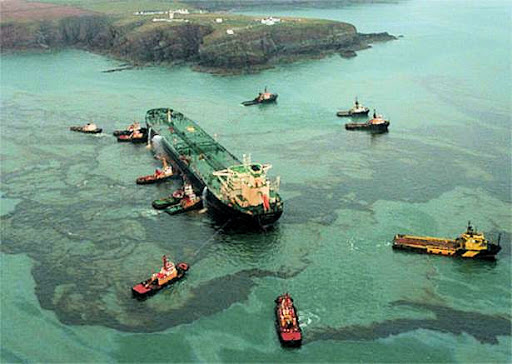
IT’S EXACTLY 27 years since Wales’ worst ecological disaster – single hull oil tanker hit rocks in the middle of the channel, holing her below the waterline.
On 15 February 1996, the Sea Empress oil tanker ran aground as it entered the Milford Haven Waterway.
Six days later, the tanker re-floated and was towed into the harbour. In the days between its grounding and towing, the oil tanker spilled 72,000 tons of crude oil along the Pembrokeshire Coastline, within the Pembrokeshire Coast National Park.
It was a Thursday morning the oil tanker was en route to the Texaco oil refinery when she became grounded on mid-channel rocks at St. Ann’s Head. Over the course of a week, she spilt 72,000 tons of crude oil into the sea. The spill occurred within the Pembrokeshire Coast National Park – one of Europe’s most important and sensitive wildlife and marine conservation areas.
Sailing against the outgoing tide and in calm conditions, at 20:07 GMT the ship was pushed off course by the current and became grounded after hitting rocks in the middle of the channel.
The collision punctured her starboard hull causing oil to pour out into the sea. Tugs from Milford Haven Port Authority were sent to the scene and attempted to pull the vessel free and re-float her. During the initial rescue attempts, she detached several times from the tugs and grounded repeatedly – each time slicing open new sections of her hull and releasing more oil.
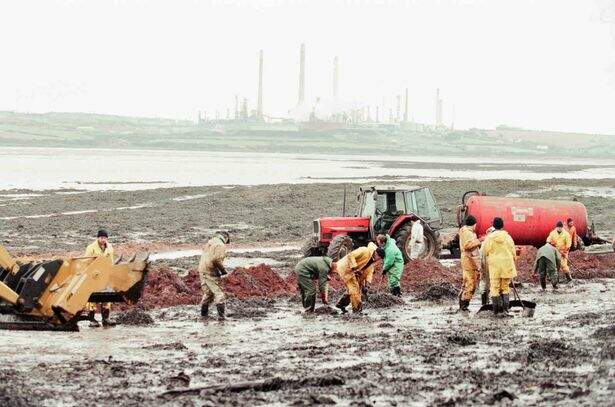
Clean up underway near Dale, Pembrokeshire following the oil spill (Image PA)
RESCUE OPERATION
A full scale emergency plan was activated by the authorities. News of the grounding was first reported at 21:18 on the BBC’s Nine O’Clock News – just over an hour after she ran aground.
Over the next few days, efforts to pull the vessel from the rocks continued.
Assisting the many local vessels, tugboats were drafted in from the ports of Dublin, Liverpool and Plymouth to assist with the salvage operation.
The tanker ran aground very close to the islands of Skomer and Skokholm – both national nature reserves, Sites of Special Scientific Interest (SSSI) and Special Protection Areas and home to Manx shearwaters, Atlantic puffins, guillemots, razorbills, great cormorants, kittiwakes, European storm-petrels, common shags and Eurasian oystercatchers.
Birds at sea were hit hard during the early weeks of the spill, resulting in thousands of deaths. The Pembrokeshire grey seal population didn’t appear to be affected too much and impacts to subtidal wildlife were limited. However, much damage was caused to shorelines affected by bulk oil. Shore seaweeds and invertebrates were killed in large quantities. Mass strandings of cockles and other shellfish occurred on sandy beaches. Rock pool fish were also affected. However, a range of tough shore species were seen to survive exposure to bulk oil and lingering residues.
A rescue centre for oiled birds was set up in Milford Haven. According to the Countryside Council for Wales (CCW), over 70% of released guillemots died within 14 days. Just 3% survived two months and only 1% survived a year.
The Pembrokeshire coast is home to common porpoises and bottlenose dolphins.
The effects of the oil and chemical pollution on these species remains unknown. Significant numbers of both species were recorded in the waters off the Skomer Marine Nature Reserve during the spring and summer of 1996.
The main containment and dispersement of the oil slick at sea was completed within six weeks. However, the removal of oil on shore took over a year until the late spring of 1997. Small amounts of oil were still found beneath the sand on sheltered beaches and in rock pools in 1999 – three years after the spill.
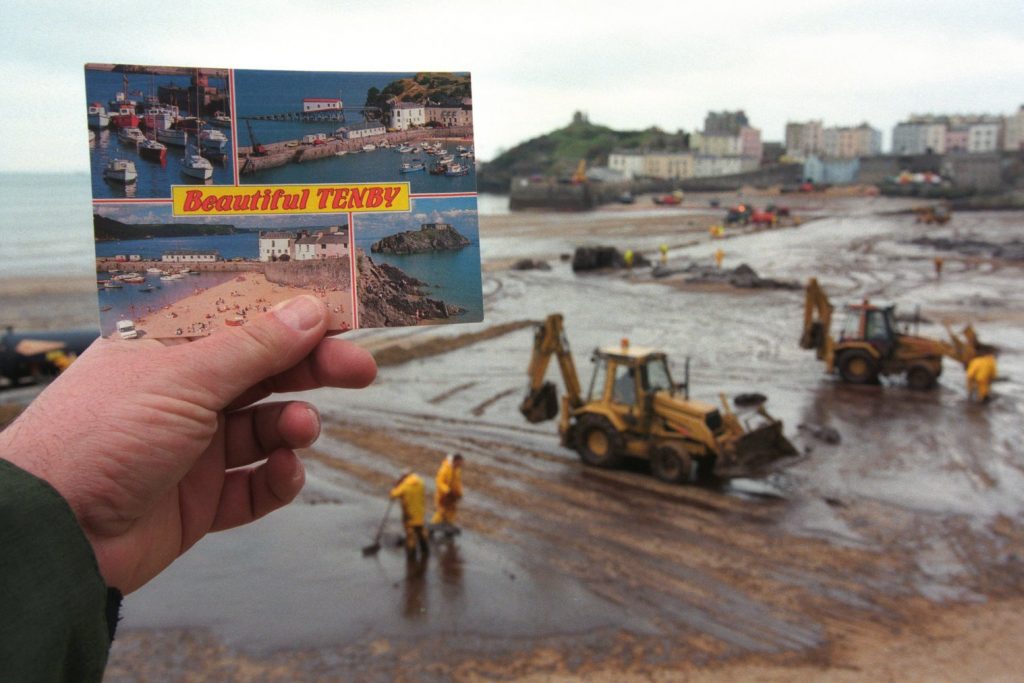
Contractors clean oil from Tenby north beach after the oil tanker Sea Empress ran aground on rocks Pembrokeshire Wales UK (Image: PA)
IT COULD HAVE BEEN WORSE
The effects of the spill were not as bad as initially predicted. This was due in part to the time of year when the spill occurred.
In February, many migratory animals had not yet arrived back in Pembrokeshire for breeding.
Along with stormy weather which helped break-up and naturally disperse the oil, the effect on wildlife would have been much worse if the spill had occurred just a month later.
The spill would undoubtedly have been catastrophic for both the environment and local economy if it had occurred during the summer months.
Much of the Pembrokeshire coastline recovered relatively quickly.
By 2001, the affected marine wildlife population levels had more-or-less returned to normal.
There was an immediate ban on fishing off the coast of Pembrokeshire and south Carmarthenshire which had a devastating impact on the local fishing industry.
The ban remained in place for several months and was lifted in stages.
Many local fishermen received financial compensation for the loss of income due to the ban.
The spill occurred just a few weeks before the Easter break when many holidaymakers would be visiting the area.
Some sheltered beaches and tidal estuaries were still covered with oil, but the main tourist locations of Tenby, Saundersfoot, Pendine, Manorbier and Bosherston were superficially cleaned.
A large clean-up operation began as soon as the Sea Empress started spilling oil.
Volunteers and paid hands alike, came together to restore the beautiful beaches of Pembrokeshire.
In the immediate days and weeks that followed, one thousand people worked around the clock to rescue oiled birds and remove oil from beaches using suction tankers, pressure washers and oil-absorbing scrubbers.
The main clean-up operation lasted several weeks and continued on a reduced scale for over a year.
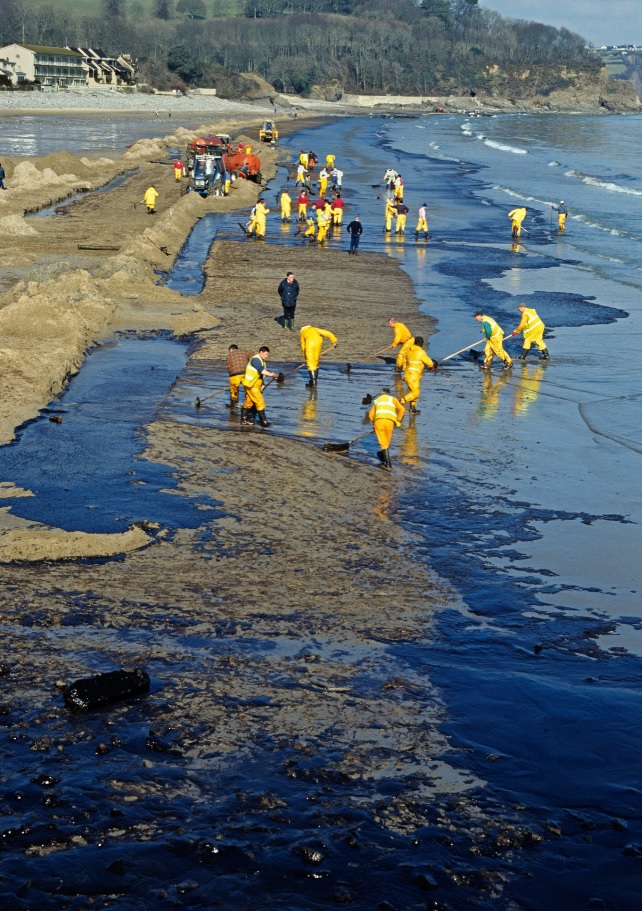
Workmen clean up the spill in Tenby (Image PA)
PORT AUTHORITY FINED £4 MILLION
Almost three years after the spill in January 1999, Milford Haven Port Authority (MHPA) was fined a record £4m after pleading guilty to the offence of causing pollution under the Water Resources Act 1991. The MHPA was also required to pay a further £825,000 prosecution costs by agreement.
The cost of the clean-up operation was estimated to be £60m. When the effects to the economy and environment are taken into account, the final cost is estimated to have been twice that, at £120m.
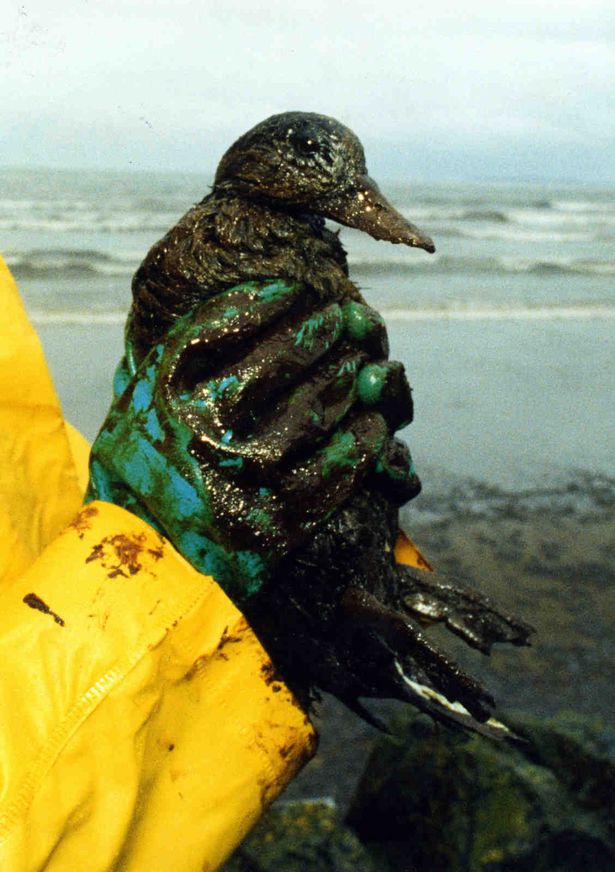
Oiled seabird rescued for cleaning (Image: File)
SHIPS BAD LUCK CONTINUES
While the cause of the initial grounding was found to be due to pilot error, it seems the vessel, even under new ownership, could not escape her run of bad luck. While attempting to dock for scrapping in Bangladesh she was ruptured again, this time by a sunken vessel.
She was renamed a further four times before her final demise, known as MV Front Spirit for a while before being sold under the name MV Ocean Opal, to Chinese buyers.
They used her as a floating storage and offloading unit from 2004. In 2010, she was converted in Shanghai into a bulk carrier, and re-flagged as the Panamanian registered MV Welwind. In 2012, she was renamed for a fifth time: MV Wind 3 and on June 3 that year the 274-metre long vessel was brought to Chittagong in Bangladesh for dismantling at the Shitakunda ship breaking yard.
On the way to the yard the ship developed a crack in one side of its engine room following a collision with a sunken ship, Hang Ro Bong, when she was attempting to anchor at the B (Bravo) anchorage of the port.
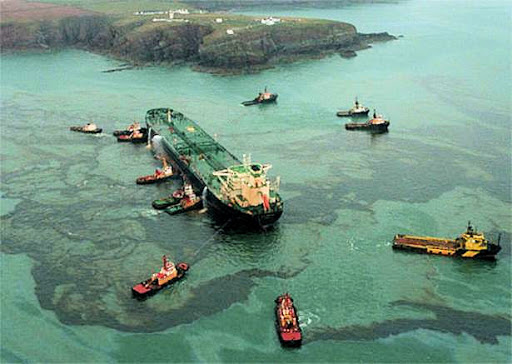
The view from above: The scale of the operation unfolds (Image: Herald archive/MCA)
LESSONS NOT LEARNED
In 2016 former local MP Nick Ainger said that the lessons from the disaster had not been learned
He told BBC Radio Wales’ Sunday Supplement programme that the scrapping of the UK’s emergency towing vessel fleet showed lessons had not been learned 20 years on- The Maritime and Coastguard Agency (MCA) said it was felt the shipping industry should fund such a service.
Mr Ainger said: “We now have a position, 20 years after the Sea Empress, 23 after the Braer, where we have no emergency towing vehicles stationed around our coast.
“Ironically, other countries in Europe, in Spain, in France, Germany, Norway have got government-financed emergency towing vessels.
“We, with our huge coastline with all the shipping that we have coming not only in and out of Milford Haven, but around our shores from the North Sea carrying crude oil, we haven’t got a government-supported emergency towing vessel.
“I think that lesson should be re-learned very, very quickly before we have another disaster.”
An MCA spokeswoman said: “The government believes that responsibility for ensuring the operational safety of ships is properly a matter for the commercial shipping industry, working in partnership with the tug and salvage industries; it did not believe that it was appropriate for the taxpayer to fund this provision.”
She added that no vessel had run aground or foundered in UK waters, nor had any pollution occurred, as a result of a ship being unable to engage a suitable towing vessel.
Following the Sea Empress disaster towing regulations in the Milford Haven waterway were tightened. Following the lead from a Scottish oil terminal, Sullom Voe, ‘escort towing’ was started. Cory Towage sent a representative to Shetland to observe and report back.
At the time the Sea Empress went aground this practice had already started in the Solent for the Port of Southampton, If Milford Haven had done the same in time, the disaster would certainly not have occurred.
Further reading: The Sea Empress’s second accident
News
Prince William faces diplomatic tightrope on first Saudi Arabia visit

Energy, trade and human rights concerns collide as UK deploys monarchy’s ‘soft power’
PRINCE WILLIAM will step into one of the most politically sensitive overseas trips of his public life this week as he travels to Saudi Arabia at the request of the UK Government.
Unlike recent royal visits to Estonia, Poland or South Africa, this tour carries significant diplomatic weight, placing the Prince of Wales at the centre of a complex balancing act between strengthening economic ties and confronting a deeply controversial human rights record.
Sources close to the Palace say William “didn’t flinch” when asked to go, viewing such duties as part of his responsibility as heir to the throne.
But Saudi Arabia presents challenges unlike almost anywhere else on the royal calendar.
A country in transition
The visit will focus on energy transition and young people, two areas the kingdom is promoting heavily as it attempts to diversify its oil-dependent economy.
In recent years Saudi Arabia has staged major sporting and cultural events, including Formula One races, international film festivals and high-profile entertainment shows. The country will also host the men’s football World Cup in 2034.
Officials argue this signals modernisation and openness.
Critics say it is “sportswashing” — using global events to distract from repression.
Human rights organisations including Amnesty International continue to raise concerns over restrictions on free speech, criminalisation of same-sex relationships and harsh penalties for dissent.
While reforms have allowed women to drive and increased participation in public life, significant legal and social limits remain.
Meeting a controversial leader
Central to the trip will be talks with Mohammed bin Salman, widely known as MBS, the kingdom’s de facto ruler.
The crown prince is credited with pushing economic reforms but remains internationally divisive.
A US intelligence report concluded he approved the 2018 killing of journalist Jamal Khashoggi inside the Saudi consulate in Istanbul — an allegation he denies and Saudi Arabia rejects.
Whether William raises such issues privately is unlikely to be disclosed. Kensington Palace does not comment on confidential conversations.
However, the prince will be briefed extensively by the Foreign Office and the British Embassy before any meetings.
Soft power diplomacy
Government insiders describe William as a key diplomatic asset.
One source said the monarchy acts as a “secret weapon”, able to open doors politicians sometimes cannot.
This form of so-called soft power has long been part of the Royal Family’s overseas role — building relationships first, leaving governments to handle the harder negotiations.
Dr Neil Quilliam of Chatham House says Saudi leaders value high-level recognition from Britain.
“Deploying Prince William sends a signal that the UK takes the relationship seriously,” he said.
Energy cooperation and investment are expected to dominate talks, particularly as Britain seeks new partners during the global shift away from fossil fuels.
Echoes of the past
The visit also reflects longstanding links between the two royal families.
King Charles III has travelled to Saudi Arabia numerous times over the decades and is said to maintain warm relations with senior figures there.
William is now expected to assume a more prominent global role as he prepares for future kingship.
A delicate balancing act
For many observers, images of handshakes between William and MBS will be uncomfortable.
Yet world leaders continue to engage with Riyadh, citing its strategic and economic importance.
The prince’s task is unlikely to involve grand statements. Instead, it will be quiet diplomacy — maintaining dialogue while representing British values.
It is a careful, sometimes uneasy role.
But it is one the monarchy has long performed: building bridges in places where politics alone struggles to tread.
Community
Ice rink campaign launched for Pembrokeshire

Survey underway as resident explores sites and funding for year-round skating facility
PLANS to bring a permanent ice skating rink to Pembrokeshire are gathering momentum after a local resident began talks with council officers and launched a public survey to test demand.

Jemma Davies, from Newgale, says the county is missing out on a major leisure attraction that could benefit families, schools and visitors while creating new jobs.
At present, the nearest full-time rink for Pembrokeshire residents is in Cardiff — a round trip of several hours — making regular skating sessions difficult for many families.
She believes a local facility could change that.
“I think it would give people something completely different to do here,” she said. “It’s exercise, it’s social, and it’s something children could take up after school instead of having to travel out of the county.”
Early talks with council
Jemma has already met officers from Pembrokeshire County Council’s sport and recreation department to discuss whether the idea could be viable.
She is also hoping to approach Sport Wales to explore possible funding streams and support.
To measure interest, she has set up an online questionnaire asking residents whether they would use an ice rink and how far they would be willing to travel.
She said early responses have been positive, with families, young people and skating enthusiasts backing the idea.
Reusing empty buildings
Rather than constructing a new arena, Jemma is investigating whether vacant premises could be converted, reducing costs.
Potential options include a former retail unit in Haverfordwest or a large hangar-style building near existing leisure attractions.
She said: “If we can reuse a building that’s already there, it keeps the costs down and brings life back into empty spaces at the same time.”
As part of her research, she plans to visit Vindico Arena to better understand the practicalities of running a rink.
More than just skating
Beyond public sessions, she believes a rink could host school trips, birthday parties, events and competitions, while encouraging young people to take up winter sports.
“Pembrokeshire has produced plenty of sporting talent over the years,” she said. “There’s no reason we couldn’t develop figure skaters or ice hockey players here too.”
Residents who want to share their views can complete the online survey.
Cover image:
Jemma Davies: Hopes to bring a permanent ice rink to Pembrokeshire (Pic: Supplied).
Cymraeg
Moonpig’s Welsh fail still on sale as mistranslated St David’s Day card sparks laughs

A GREETING card meant to celebrate St David’s Day has become an accidental comedy hit after shoppers spotted its Welsh message makes absolutely no sense – and, even better, it is still on sale.
The card, sold by online retailer Moonpig, reads: “Hapus Dewi Sant Dydd.”
Unfortunately for the designers, that translates back into something closer to “Happy David Saint Day” or “Day Saint David Happy” rather than the correct Welsh phrase, “Dydd Dewi Sant Hapus.”
In other words, the words are right – just in completely the wrong order.
The mistake was first highlighted by Nation.Cymru, prompting plenty of amusement online, with some joking it looked like the result of a lazy copy-and-paste from an automatic translator.
The Herald decided to check for itself.
And yes – as of today – the card is still live and available to buy on Moonpig’s website.
Customers can personalise it and add it to their basket just like any other design, with no sign the message has been corrected.
One reader joked: “It’s like they put the words in a hat and picked them out at random.”
Another described it as “peak AI Welsh”.
For Welsh speakers, the error is immediately obvious. Welsh sentence structure differs from English, so simply translating each word individually rarely works. It’s the linguistic equivalent of writing “Birthday happy you” on a cake.
There was also online chatter that the dragon artwork may be facing the wrong direction – though by that point, the language had already stolen the show.
With St David’s Day cards meant to celebrate Welsh culture, the gaffe feels particularly ironic.
Still, if you fancy a collector’s item or a bit of office wall décor, you might want to be quick. Once someone at Moonpig finally runs it past an actual Welsh person, this one could quietly disappear.
Photo caption: The mistranslated St David’s Day card still available for sale on the Moonpig website (Pic: Moonpig).
-

 Health3 days ago
Health3 days agoHealth board targets rise in steroid and gym drug use across west Wales
-

 Crime4 days ago
Crime4 days agoSex offender jailed after living off grid in Pembrokeshire and refusing to register
-

 News5 days ago
News5 days agoPrincess of Wales visits historic Pembrokeshire woollen mill
-

 Crime3 days ago
Crime3 days agoTeacher injured and teenager arrested for attempted murder at Milford Haven School
-

 Health7 days ago
Health7 days agoDoctor struck off after sexual misconduct findings at Withybush Hospital
-

 News7 days ago
News7 days agoHerald journalists to feature in true-crime documentary on local lockdown murder
-

 Crime5 days ago
Crime5 days agoHakin man’s appeal delayed again as Crown Court seeks guidance on insurance law
-

 Crime6 days ago
Crime6 days agoArrest made after Carmarthen park stabbing investigation





























